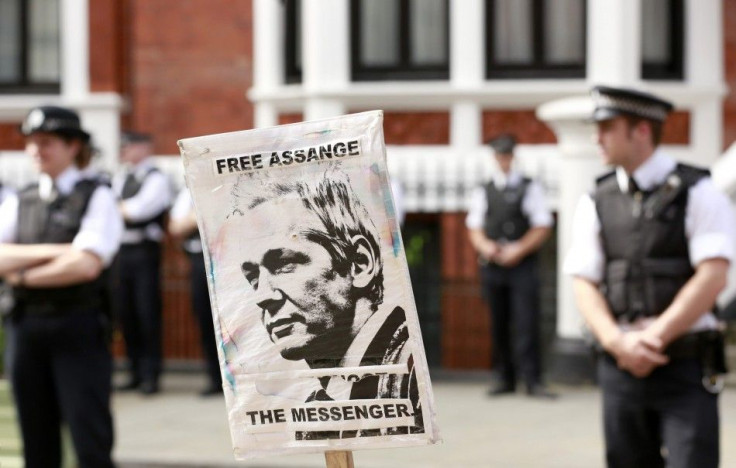Assange to Speak Out From Embassy Refuge

WikiLeaks founder Julian Assange prepared to speak out Sunday on the standoff between Britain and Ecuador over his future by speaking from a balcony of the Ecuadorean Embassy in London, his refuge from arrest.
Ecuador has granted political asylum to the former computer hacker who incensed the United States and its allies by using his WikiLeaks website to leak hundreds of thousands of secret U.S. diplomatic and military cables in 2010.
WikiLeaks had said Assange would make a statement outside the embassy to mark two months since he took refuge there, stirring speculation that he would be arrested by British police arrayed in force outside the building, Reuters reported.
But a workman inside the embassy could be seen Sunday morning prizing the hinges off a door leading to a small balcony on the corner of the embassy, signaling that Assange would speak from that perch to keep himself safe from arrest.
"I cannot go into details of that for security reasons," a spokesman for WikiLeaks said when asked how Assange would make his statement, which was expected at around 3 p.m. London time.
Assange, an Australian, is wanted in Sweden for questioning regarding allegations of rape and sexual assault and Britain has said he will not be granted safe passage out of his Ecuadorean embassy refuge, which enjoys diplomatic status. He says he fears Sweden would eventually hand him over to the United States where, in his view, he would face persecution and long-term imprisonment.
Ecuadorian Embassy officials told CBS News last week that they have repeatedly offered Swedish investigators opportunities to question Assange at the embassy, but those offers have been turned down.
Ex-Spanish judge Baltasar Garzon, who is representing Assange, met with the activist inside the embassy and told reporters that the Australian remains determined.
"I have spoken to Julian Assange, and I can tell you that he is in fighting spirit. He is thankful to the people of Ecuador and especially to President [Rafael] Correa for granting him asylum," said Garzon. "He has always fought for the truth and justice, he has always defended human rights and will continue to do so. He demands that WikiLeaks and his own rights also be respected."
Garzon said that Assange had "instructed his lawyers to carry out legal actions to protect the rights of WikiLeaks, Julian himself, and all those who are currently being investigated," but did not offer any further explanation.
He also said that Ecuador could consider making an appeal to the International Court of Justice in the Hague in order to compel Britain to grant Assange safe passage out of the country.
© Copyright IBTimes 2025. All rights reserved.





















